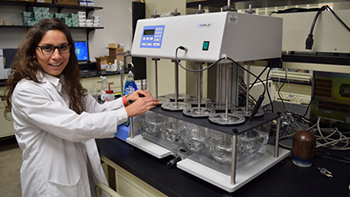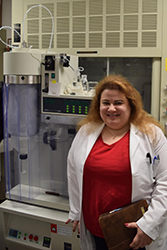Heidi M. Mansour, PhD (above center), a University of Arizona College of Pharmacy assistant professor in the Department of Pharmacy Practice and Science, is working to develop advanced dry powder inhalers to treat and prevent pulmonary diseases. She and her research team recently published a paper in Expert Opinion on Drug Delivery titled “Dry Powder Inhalers in COPD, Lung Inflammation and Pulmonary Infections” detailing their work related to chronic obstructive pulmonary disease (COPD) and related disorders.
Dr. Mansour’s lab investigates pulmonary states and diseases that have unmet medical needs, including lung transplants, lung cancer, COPD, pulmonary fibrosis, bronchiolitis obliterans syndrome, cystic fibrosis, pulmonary infections, pulmonary hypertension and more. The goal is to design treatments for these pulmonary conditions by researching and developing new drugs as well as designing and developing the delivery mechanisms for these drugs. Her research program brings together surface chemistry, nanotechnology, particle engineering and lung biophysics to develop and test dry powder inhalation aerosols – that is, inhalers.
Click on the video to hear Dr. Mansour describe the broad impact of work her team is doing to translate their research into relief for lung disease sufferers. [Dr. Heidi M. Mansour from UA College of Pharmacy.]
She has been involved in pulmonary research since she was a pharmacy student studying lung surfactants. But she says that even before pharmacy school, she was interested in research.
“Both of my parents are microbiologists, so I’ve always been interested in science. Growing up, I used to go to their labs. I just became more and more interested in it, and decided with grad school to further pursue it. Multidisciplinary medicine and pharmacy, chemistry, nanotechnology – I became interested in being able to integrate all those basic disciplines into designing and developing advanced multifunctional drug delivery systems and then testing them both in vitro and in vivo.”
Her work in the area of lung surfactants provided her with the chance to research therapeutic inhalation aerosols, which led to her current research in advanced dry powder inhalers.
According to Dr. Mansour, delivering drugs to the lungs is the best way to treat many pulmonary diseases. This is also an efficient way to circulate drugs to other parts of the body to treat other diseases. For these reasons and others, this sector of the pharmaceutical market is growing. However, unique challenges and complexities accompany this method of drug delivery.
“It [the lung] is the organ of life that we’re targeting, so there are added regulations and added safety limits that we have to work within,“ Dr. Mansour says. “You’re restricted in the volume and mass you can deliver because you can’t block the airways and suffocate the patient. These are drug-device combination products with additional challenges in inhaler device design, formulation design, and device-formulation interactions. There are added regulations for this class of products within the FDA.”
 Dr. Mansour's lab group includes Maria Fernanda Acosta, PhD (operating equipment left), Megan Carver, Alexan Issac Gomez, Monica Malapit, Evan Mallory, Priya Muralidharan, PhD, and Haeun Park. In the photo at the top of the page, Carver, Dr. Mansour and Gomez chat in the lab.
Dr. Mansour's lab group includes Maria Fernanda Acosta, PhD (operating equipment left), Megan Carver, Alexan Issac Gomez, Monica Malapit, Evan Mallory, Priya Muralidharan, PhD, and Haeun Park. In the photo at the top of the page, Carver, Dr. Mansour and Gomez chat in the lab.
To her, however, these challenges are worth the reward of seeing a product work and have a positive therapeutic effect on the population. Her goal for the future of this translational pulmonary medicine research is to see these advanced dry powder inhalers end up on pharmacy shelves, remembering the point of lab research is to have a positive therapeutic effect on people’s health while meeting unmet medical needs.
 As a pharmacy educator as well as a researcher, Dr. Mansour sees training the future generation as one of the most rewarding aspects of her work. She has trained postdoctoral scholars, visiting scholars and professors, graduate students, physician-scientist fellows, pharmacy student researchers and undergraduate student research fellows. Her research program has produced a number of assistant professors employed at research universities in the United States and South Korea and senior research scientists employed at major pharmaceutical companies in the United States.
As a pharmacy educator as well as a researcher, Dr. Mansour sees training the future generation as one of the most rewarding aspects of her work. She has trained postdoctoral scholars, visiting scholars and professors, graduate students, physician-scientist fellows, pharmacy student researchers and undergraduate student research fellows. Her research program has produced a number of assistant professors employed at research universities in the United States and South Korea and senior research scientists employed at major pharmaceutical companies in the United States.
“To mentor postdoctoral fellows and see graduate students trained is very rewarding,” she says. “To conduct scientific research is rewarding from an academic, scholarly perspective, but also from a medical, translational perspective. It’s a labor of love. It’s not something you get sick of or tired of doing.”
Dr. Mansour has faculty appointments in the BIO5 Institute, University of Arizona Cancer Center and UA Institute of the Environment. Her current and recent research funding has been from the National Institutes of Health, U.S. Food and Drug Administration, Cureveda, Buchi, GlaxoSmithKline, Pfizer, DMV-Fonterra Excipients and InSys Therapeutics.
Story and photos by Elizabeth Harris, communications assistant, UA College of Pharmacy
Video by Ricky Bergeron, UA BioCommunications
A media release for this article also can be found at: "UA College of Pharmacy Faculty Member Dr. Heidi Mansour Develops Inhalers to Treat Lung Diseases"


